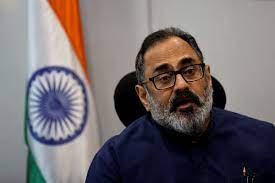Table of Contents
New Delhi, July 26, 2024: In a significant development amidst the ongoing geopolitical tensions between India and China, the IT Deputy Minister, made a statement indicating India’s willingness to accept Chinese investments in the country’s burgeoning technology sector. The announcement comes as a surprise, given the strained relations between the two Asian giants in recent years. The move signals India’s cautious approach toward economic cooperation while navigating complex geopolitical dynamics.
Divergent Paths and Strategic Calculations
India’s Information Technology sector has emerged as a crucial pillar of the nation’s economy, contributing significantly to GDP growth and employment generation. The country’s tech industry has garnered international recognition for its skilled workforce and innovation capabilities. In recent years, it has become a hub for multinational corporations and startups alike, attracting substantial foreign investments from various countries.
Over the past few years, India-China relations have been marred by border disputes, trade imbalances, and regional influence struggles. These issues have led to heightened mistrust between the two nations, creating an air of caution in their bilateral dealings. Despite these challenges, both countries seem to recognize the importance of cooperation in certain areas, especially in the economic domain.
Deputy Minister’s Diplomatic Overture
During a high-level summit on economic cooperation, Deputy IT Minister Rajeev Chandrasekhar acknowledged the complexities of India-China relations but expressed a pragmatic approach towards economic collaboration. He stated that India is open to accepting investments from Chinese companies, particularly in the technology sector, under certain conditions.
The IT Deputy Minister emphasized that any Chinese investment in the IT sector would be subject to rigorous scrutiny and comply with existing Indian regulations. India is committed to protecting its national interests and ensuring that such investments do not compromise the country’s security or sovereignty. The government will carefully assess each investment proposal to safeguard against any potential threats to critical infrastructure or technology transfers that could adversely impact India’s strategic advantage.
Despite the geopolitical challenges, fostering economic cooperation between India and China can lead to mutual benefits. Chinese companies have shown interest in gaining market access to India’s vast consumer base, while India stands to benefit from capital infusion, job creation, and technology transfer. Both countries share an interest in advancing their technology sectors, and strategic collaboration could accelerate innovation and create a win-win situation for all stakeholders involved.

A Balancing Act: Geopolitics vs. Economic Imperatives
India’s stance on Chinese investments reflects a careful balancing act between addressing geopolitical concerns and harnessing economic opportunities. By maintaining a pragmatic approach, India aims to protect its national interests while engaging in diplomatic overtures to bridge the gaps in bilateral relations.
The Deputy Minister’s statement could have implications beyond India and China. As two of the largest Asian economies, their cooperation, or lack thereof, can influence regional dynamics. A measured approach to economic collaboration could potentially set the stage for improved regional trade and investment relations in the future.
India’s acceptance of Chinese investments in its IT sector, despite ongoing geopolitical tensions, marks a notable step in diplomatic and economic relations between the two countries. By adopting a conditional approach, India aims to ensure that its economic growth and strategic interests are protected while fostering cooperation in areas of mutual benefit. As both nations navigate their complex relationship, the Deputy Minister’s announcement signals a willingness to engage and explore potential avenues for cooperation in the ever-evolving world of technology and economics.













